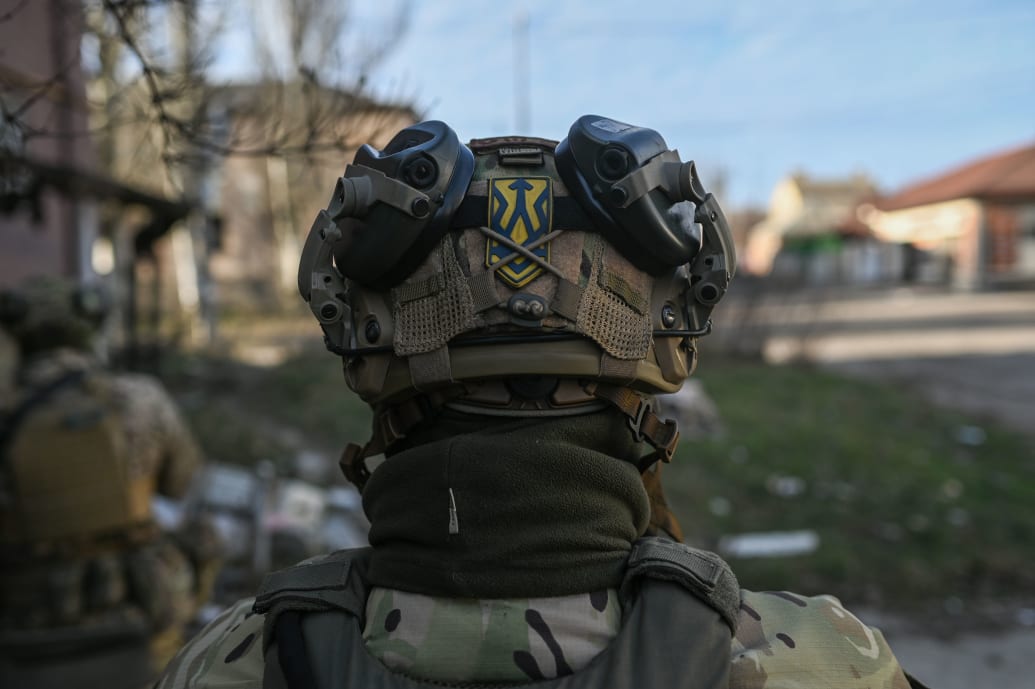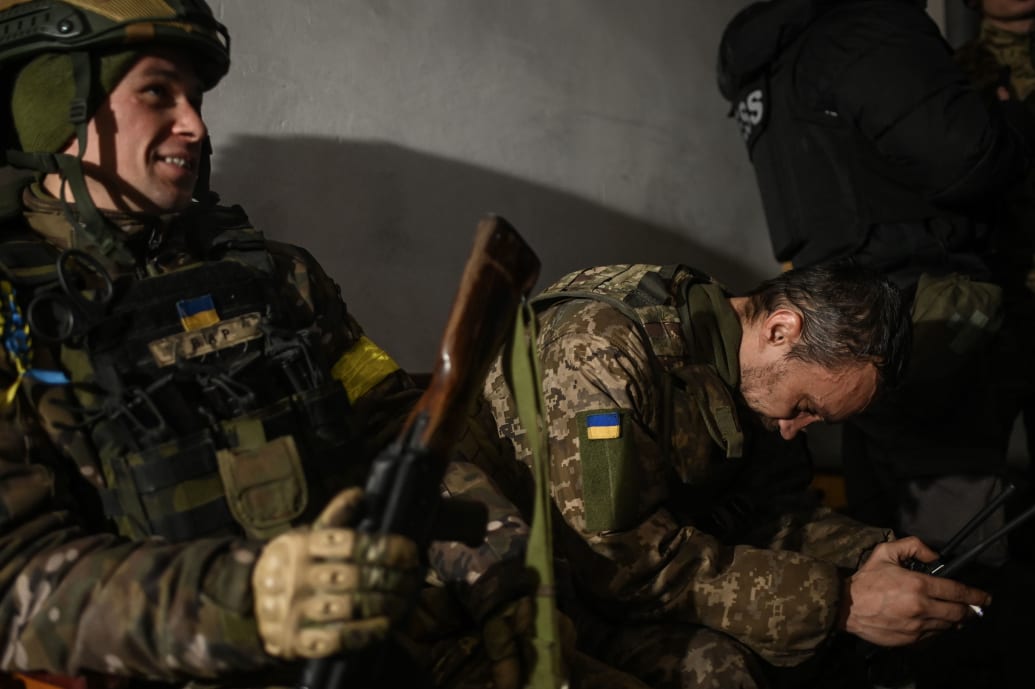BAKHMUT, Ukraine—In the smoke-filled basement of a nondescript building in the city center of Bakhmut, eastern Ukraine, the men of the SKALA intelligence battalion are getting ready for a risky reconnaissance mission. One of them is burning a last cigarette in the dimly-lit hallway. Clad in a bulletproof vest and helmet, a bearded soldier wraps yellow tape around both his arms—a sign used by Ukrainian soldiers to identify each other on the battlefield. “Be careful out there, there are snipers in this area,” a portly officer warns him, rising from his office chair facing a flatscreen TV that intermittently broadcasts the live-feed of a drone flying over carnage in the city. “I can’t die, my mom won’t let me,” quips the soldier with a weary smile, checking his gear one last time before heading out.
The previously-muffled sound of outgoing artillery becomes sharper and louder as the door to the street swings open. They take off.
“The situation is pretty tense, but we’re controlling it,” says 23-year-old Alexander, clutching his American-made M4 assault rifle. “We’re holding.” With his buzzcut and boyish looks, the young man wouldn't look out of place in a trendy nightclub in downtown Kyiv. Yet, for weeks, Alexander and the grizzled soldiers of the SKALA battalion have been weathering the storm of daily Russian assaults and shelling on Bakhmut, hunkering down in the basement and doing daily sorties in the gray zone—the stretch of land between Ukrainian and Russian positions. Named after its founder and leader Iurii Skala, the SKALA battalion is tasked with conducting air and ground reconnaissance, as well as “cleaning operations”—a euphemism meaning assaulting enemy positions and taking out the Russian soldiers manning them.
“The drones are our eyes, out there,” says Alexander. Out there is Bakhmut—a salt-mining town of 70,000 inhabitants known for its sparkling white wine—that has been devastated by months of relentless Russian shelling, and gruesome trench warfare that has prompted comparisons with the Battle of the Somme or Passchendaele. The town is a major transport hub and sits on a strategic highway that runs through Ukraine’s Donetsk and Luhansk regions. Yet, some—including one of Ukraine’s top generals—have argued that the town’s strategic value is dubious at best. However, it is one of the few frontline areas where the Russians are still on the advance, and the success-starved Russian high command is desperate to claim a victory, at any cost. Some have theorized that the capture of Bakhmut would constitute a personal prize for Yevgeny Prigozhin, the founder of the infamous Wagner paramilitary group, whose mercenaries make up most of the Russian forces in the area. The U.S. believes Prigozhin has a financial motive: Wagner has often seized lucrative gold and diamond mines in areas where it operates in Africa, and Prigozhin may have set his sights on the salt and gypsum mines around Bakhmut.
According to Rem, a former car dealer from Dnipro now correcting artillery fire with the help of his drone, most of the soldiers sent in suicidal assaults on Ukrainian positions in Bakhmut are “zeks,” or convicts, recruited by Wagner to bolster the number of Russian forces in Ukraine. “Mobiks [conscripts] are usually scared, and they scatter when they get shelled. Those guys are not scared,” he said.
Of the Wagnerites, Rem says that they’re a much more effective fighting force than they’re usually given credit for: “They’re making progress, after all.” Desensitized to violence and with nothing left to lose, the prisoners—many of whom are violent criminals including murderers and rapists—are considered by Ukrainian soldiers a tougher enemy than the average army conscript.

A Ukrainian service member stands outside his outpost in Bakhmut during a drone reconnaissance operation on December 01, 2022.
Justin Yau
The Russian tactic of sending prison recruits to attack Ukrainian positions—allowing them to identify defenses for the artillery to pummel afterwards—has proven effective, though slow and deadly. While no major breakthrough has occurred, they have been slowly eroding Ukrainian defenses, and creeping every closer to the eastern outskirts of the city.
This assessment was echoed in late December by Oleksandr Danylyuk, a former national security adviser for Ukraine currently working on military planning, who said of the prison conscripts: “They are—I cannot say fearless—but they have nothing to lose pretty much. So, they are attacking constantly and they’ve been killed in big quantities as well.”
Yet those incremental gains on the eastern approach to the city have come at a cost for Russian forces, as evidenced during Prigozhin’s well-publicized visit to the frontline over the New Year. In a series of videos released by Russian news agency RIA Novosti, the Wagner boss first visits a basement filled with the bodies of his fighters, many of them convicts, killed during the battle for Bakhmut, before complaining that “every house [in Bakhmut] has become a fortress”—and that it sometimes takes a week of fighting to take a single house.
According to a U.S. official quoted by The Guardian on Thursday, out of an initial force of nearly 50,000 mercenaries, Wagner has sustained more than 4,100 killed in action and 10,000 wounded, including over 1,000 killed between late November and early December near Bakhmut.
Volodymyr Zelensky’s visit to the city in late December underscored the symbolic value of “fortress Bakhmut”—and the sacrifices made to defend it. A Ukrainian officer serving in the East, who asked to remain anonymous, ventured an estimate of a dozen casualties a day.
Outside SKALA’s command center, the streets are almost empty, save for a couple of civilians hurrying along, carrying grocery bags or pulling carts filled with empty water bottles. The thundering sound of shelling echoes through empty avenues and deserted public squares, bouncing off the facades of destroyed residential buildings and closed-down shops. Here and there, the rocket of a GRAD multiple rocket launcher can be spotted planted upright in the asphalt.
A couple of blocks away from SKALA’s headquarters, sixty-something Hrihorii is busy cutting firewood on the car park of his residential building, seemingly oblivious to the outgoing artillery fire booming in the distance. Clothed in warm winter clothing and black plastic boots, the man says he has no intention to leave his apartment – despite the windows having been shattered the day prior to our visit. “I am waiting for the Ukrainian army to win,” he says with a smile. “I am not leaving.” Next to him, food is simmering in a pot placed over an open fire. The crater from last morning’s shelling is located a mere feet away from his improvised kitchen. Had he been cooking at the time of its landing, Hrihorii would have died.
Back at the command post, a group of a dozen soldiers are returning from a mission in the “gray zone.” The soldiers, drenched in sweat and amped up on adrenaline, hurry through the door, cursing loudly. Roman, a soldier from Dnipro, lights up a cigarette and introduces the other members of his crew, in broken English : Vansi, a heavyweight soldier who had served in Donbas in 2015, and “Bakhmut,” who now serves in the charred ruins of his hometown after sending the rest of his family to safety in Bulgaria. “I haven’t run like this in twenty years,” exclaims Roman, panting. According to him, 50 year-old Russian T-62 tanks were operating in the area. “We couldn’t see them, but we could hear them,” he says. The use of such obsolete models points to the growing deficit of equipment and vehicles among Russian forces, a problem compounded by the sanctions that have targeted the country’s military industry. Yet Ukrainian soldiers say the Russians shouldn’t be underestimated. “It’s still very loud out there, the fight is not over,” says Roman, putting out his cigarette.

Roman (left) and “Bakhmut” (right) are among the Ukrainian fighters frustrating Russia’s efforts to take Bakhmut.
Justin Yau
"like this" - Google News
January 08, 2023 at 06:38AM
https://ift.tt/X4B8jC0
Wagner's Desensitized Prison Fighters Keep Staggering into Bakhmut Like This Is a Zombie Apocalypse - The Daily Beast
"like this" - Google News
https://ift.tt/Btdpaq7
Shoes Man Tutorial
Pos News Update
Meme Update
Korean Entertainment News
Japan News Update
No comments:
Post a Comment